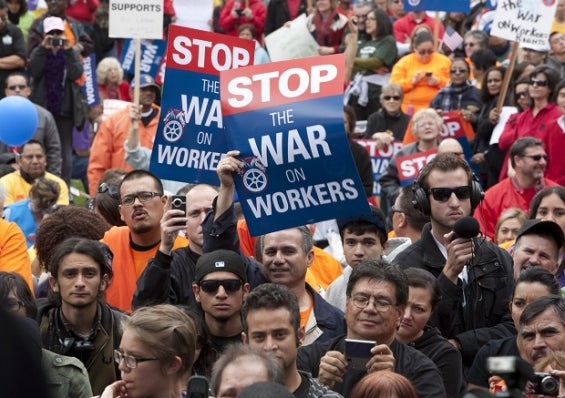Headline News
Dollars, Not Sense, Rule Tax Policy Favoring Rich, Corporations

Dollars increasingly dominate when it comes to government and elections. We’ve written about this before here. But it’s not only at the ballot box. In fact, the results of donations by big business hit somewhere even more important to most middle-class families — their wallets.
One example is a recent poll which found 56 percent of Americans backed a proposal rolled out by President Obama in his State of the Union address that would raise capital gains taxes on households earning more than $500,000 a year. The same survey found that two-thirds of those asked said the wealthy currently pay too little in federal taxes.
It’s well known that the average wealthy household pays a lower effective tax rate than many workers in the middle class. The top tax bracket may be 39.6 percent, but many of the rich get most of their earnings through investments, which are taxed no higher than 20 percent. Thus, the average effective tax rate paid by the top one percent was only 23.5 percent in 2011.
If that doesn’t set off workers’ alarm bells, what’s going on at the state and local level should. As infrastructure, schools and pension plans lag behind, a report by the Institute on Taxation and Economic Policy (ITEP) shows that the lowest fifth of households pay more than twice the effective state and local tax rate (at 10.9 percent) as the richest 1 percent.
Clearly, this isn’t just a Washington problem. It is a big money problem. In states such as Wisconsin, Ohio and North Carolina, elected officials are either weighing plans that would give corporate interests or the rich big tax cuts, or trying to balance the budget on the back of hardworking people to cover handouts given to America’s most wealthy already.
“In recent years, multiple studies have revealed the growing chasm between the wealthy and everyone else,” said Matt Gardner, executive director of ITEP. “Upside down state tax systems didn’t cause the growing income divide, but they certainly exacerbate the problem. State policymakers shouldn’t wring their hands or ignore the problem. They should thoroughly explore and enact tax reform policies that will make their tax systems fairer.”
But that seems unlikely to happen, either in the states or on Capitol Hill. Why? Because too many lawmakers — despite the pleading of the public and experts in the field — are listening to their contributors, fairness be damned. Big business and the wealthy are getting the tax breaks and rigging the game, while rank-and-file workers either pick up the tab or watch essential services be cut.
It’s no way to run a country. In fact, it should be against the law.